中西方文化差异 英文版
- 格式:ppt
- 大小:608.00 KB
- 文档页数:40
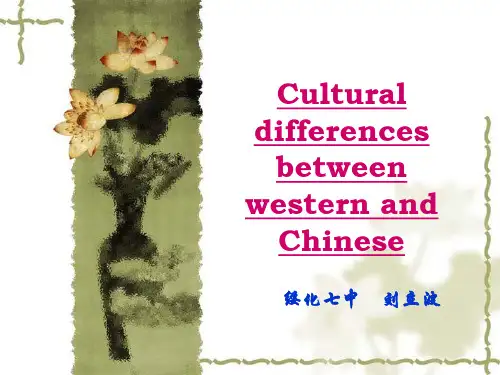
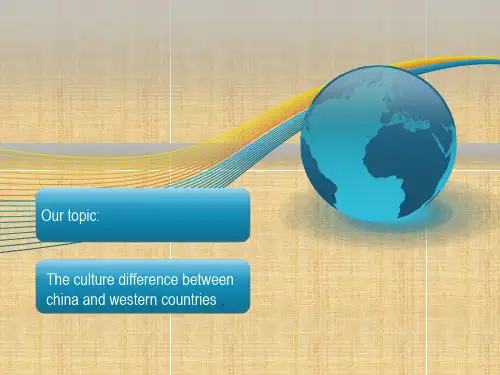
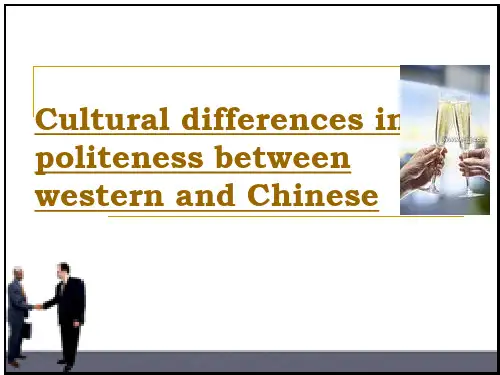
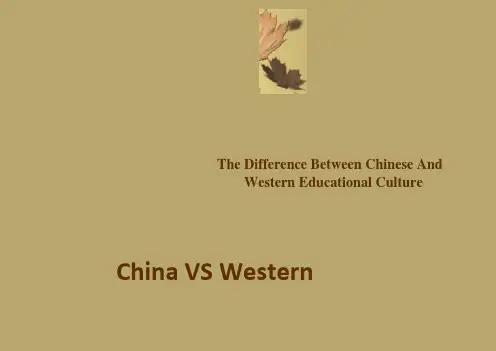
The Difference Between Chinese AndWestern Educational Culture China VS Western尙〔.difference of familv educationDiffere nee2.difference of school education1Difference between china education and western educationEducation is not the preparation for making their living, but for survivalYr The education'sgoal is for making their living, for honor Emphasize" The Learn Education."ChinaWestern Countriesreputation ineducation the childCare about the凸China Education method匕1.Emphasize mechanical memorizi ng.2」f the book is readhundreds of times,its meaning isshown naturally^WesternCountries 魂1.Emphasize thechilcTs” power ofunderstanding." 樺2.Seeking theknowledge from lifeand nature.Education inFj Chinal.Earning money tosupport ongs familyand managing thewealth are adult's* matter.・Try every means to $ satisfy the children 1with money・managing money璋Western Countries# l.Teach the child take theplans for budget items,learn to spend moneyreas onably.弊2・Encourage the childto work outside to gain income by themselves.American children in class Chinese children in classDifferences of schooleducationThe relation between teachers andstudentsIn America teachers are no longer authority, meanwhile students don't have to carry out every instruction from their teachers, most of them have their thoughts, they may most questions and challenges toteachers・如n chin可the relaUonship between teachers and students can be quite formal.# We are taught since the first day when we go to the kindergarten that we should sit up straight and obey all the disciplines. in class we seldom challenge the teacher's ideas.Summary凸l.Westerners believe in individualism, and Chinese believe in collectivism.匕2.The western culture has the freedom to express affection freely,whereas the Chineseculture is puritanical.蜉3.The Chinese believe in relationships, and searching for inner bliss and happiness through meditation.鏗4.The western culture believes in a materialistic approach, and has a pragmatic and emotional attitude・。
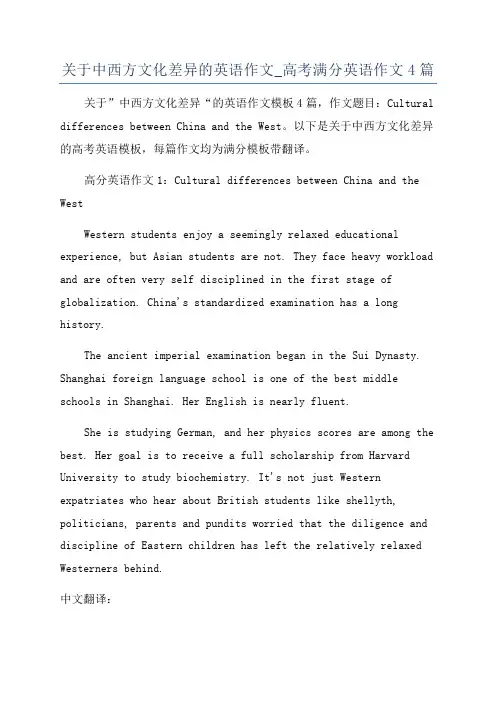
关于中西方文化差异的英语作文_高考满分英语作文4篇关于”中西方文化差异“的英语作文模板4篇,作文题目:Cultural differences between China and the West。
以下是关于中西方文化差异的高考英语模板,每篇作文均为满分模板带翻译。
高分英语作文1:Cultural differences between China and the WestWestern students enjoy a seemingly relaxed educational experience, but Asian students are not. They face heavy workload and are often very self disciplined in the first stage of globalization. China's standardized examination has a long history.The ancient imperial examination began in the Sui Dynasty. Shanghai foreign language school is one of the best middle schools in Shanghai. Her English is nearly fluent.She is studying German, and her physics scores are among the best. Her goal is to receive a full scholarship from Harvard University to study biochemistry. It's not just Western expatriates who hear about British students like shellyth, politicians, parents and pundits worried that the diligence and discipline of Eastern children has left the relatively relaxed Westerners behind.中文翻译:西方学生享受着看似轻松的教育体验,但亚洲的学生却并非如此,他们面临着繁重的工作量,而且在全球化的第一阶段往往非常自律。
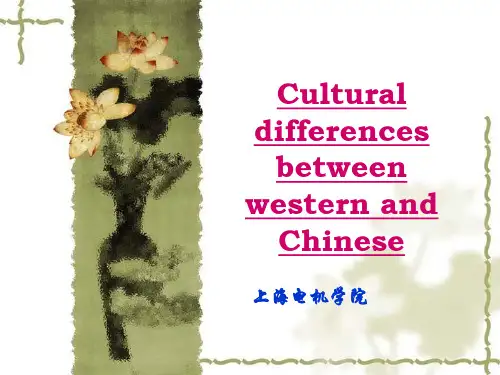
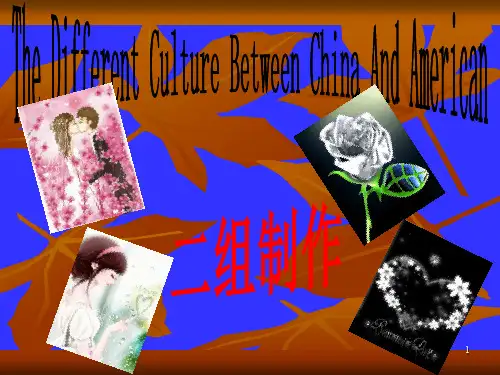
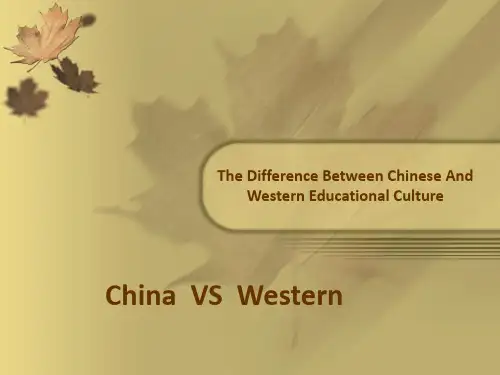

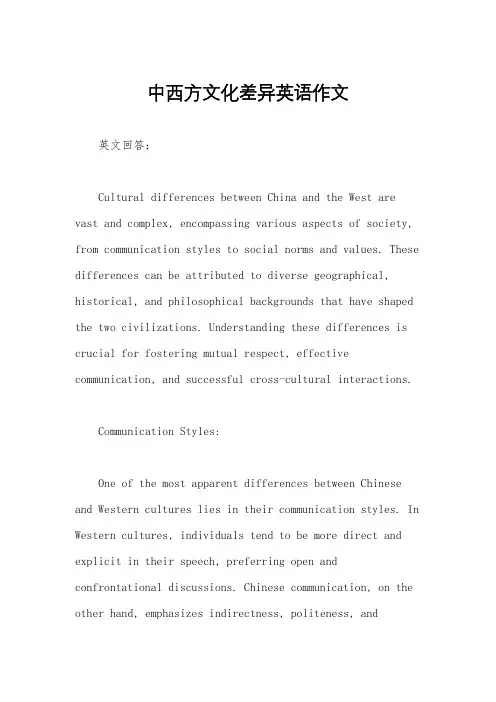
中西方文化差异英语作文英文回答:Cultural differences between China and the West are vast and complex, encompassing various aspects of society, from communication styles to social norms and values. These differences can be attributed to diverse geographical, historical, and philosophical backgrounds that have shaped the two civilizations. Understanding these differences is crucial for fostering mutual respect, effective communication, and successful cross-cultural interactions.Communication Styles:One of the most apparent differences between Chinese and Western cultures lies in their communication styles. In Western cultures, individuals tend to be more direct and explicit in their speech, preferring open and confrontational discussions. Chinese communication, on the other hand, emphasizes indirectness, politeness, andharmony. Chinese speakers often use euphemisms, subtle gestures, and implicit meanings to convey messages.Social Norms and Values:Social norms and values also exhibit significant variations between the two cultures. Western societies prioritize individualism and personal autonomy, encouraging people to express their opinions freely and pursue their own ambitions. In contrast, Chinese culture emphasizes collectivism and social harmony, valuing conformity, respect for authority, and the preservation of relationships.Hierarchy and Power Structures:Hierarchical structures and power dynamics differ markedly in Chinese and Western cultures. Western societies tend to adopt a more egalitarian approach, whereindividuals are generally treated as equals and have equal rights and opportunities. In Chinese culture, hierarchy plays a more prominent role, with clear distinctionsbetween superiors and subordinates in both social and professional settings.Time Perception and Punctuality:Time perception and punctuality are other areas where cultural differences manifest. Western cultures place a high value on timeliness and punctuality, adhering tostrict schedules and viewing time as a linear progression. Chinese culture, on the other hand, often perceives time as fluid and cyclical, with a greater emphasis on flexibility and adaptability rather than strict adherence to schedules.Religion and Spirituality:Religion and spirituality also contribute to cultural differences. Western cultures have been predominantly influenced by Christianity, which emphasizes the importance of individual faith, salvation, and a direct relationship with God. Chinese culture, on the other hand, is characterized by a blend of indigenous beliefs, Buddhism, Confucianism, and Taoism, which promote a holistic view ofthe world, harmony with nature, and ancestral reverence.Food and Dining Customs:Food and dining customs reflect cultural differences as well. Western dining etiquette typically involvesindividual meals eaten using utensils at a table, with an emphasis on portion control and table manners. Chinese dining customs, in contrast, often emphasize communal dining, with food shared among multiple individuals using chopsticks. Food is often served in large portions, and there is a greater emphasis on variety and flavor.中文回答:中西方文化差异。
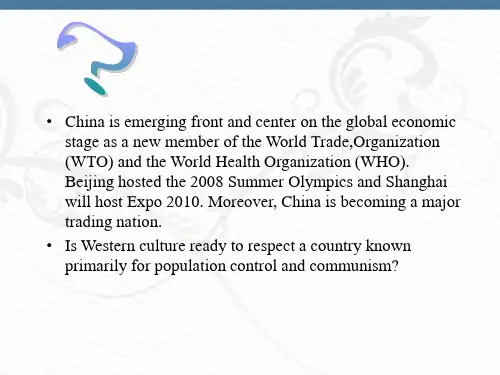
中西方节日文化差异英文作文Culture Differences of Chinese and Western Traditional FestivalAbstractTraditional festivals are the historical products of a nation’s development. Whether in China which has a long history of more than five thousand years or in the newborn America, the origination of traditional festivals in the two countries is similar. Most traditional festivals originated from people’s expectation for harvest in the agricultural production, the worship towards the gods and the nature, sacrifices to the historical characters and etc. After the long-term evolution, traditional festivals have become an indispensable part of the national culture. Through traditional festivals, the distinct cultural characteristics of a people and the national spirits can be observed. Since the ancient time, China has been a large agricultural country, the small-scale economic mode known as ―The men plough and the women weave‖ initiated the agricultural civilization of Chinesecharacteristics. Chinese traditional festivals are deeply rooted in the agricultural civilization and greatly influenced by Confucianism. To some extent, Chinese traditional festivals have relieved from the primitive taboos and tended to be happy festivals which reflect the concept of harmony and integration in Confucianism. In America, religion plays a very important role in people’s life. With various branches, the religious system of America is quite complicated, among which Christianity is of the greatest importance. Some American traditional festivals are the direct products of Christianity and most festivals have evolved into the religious festivals later. This paper is designed to discuss the differences in customs, origins and other aspects of traditional festivals with the similar cultural connotation, then analyze the reasons lying behind the differences and finally reflect the cultural differences of the two nations. The paper also analyzes the mutual fusion in tradtional holidays between China and the west.Key words: Traditional festivals; Chinese and American culture; cultural differences; causes; mutual fusion.中西方传统节日文化的差异摘要传统节日是一个民族发展的历史产物。